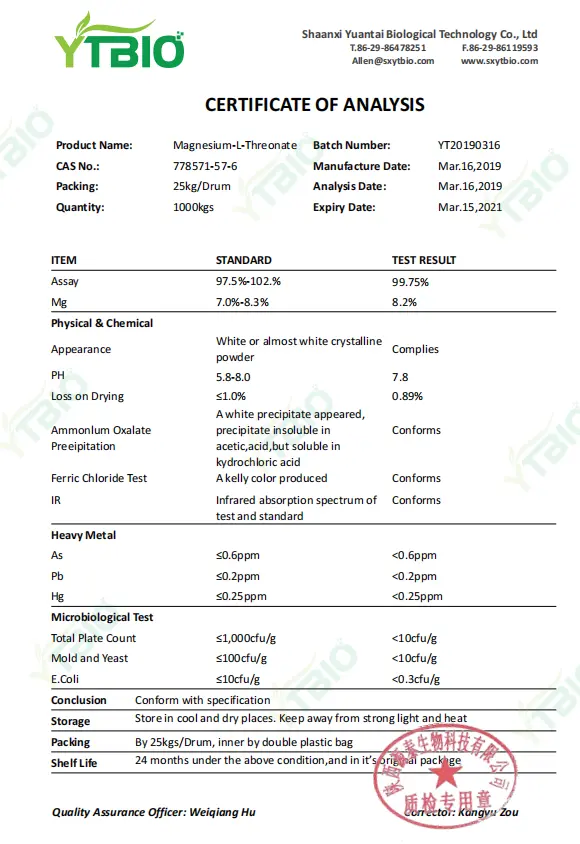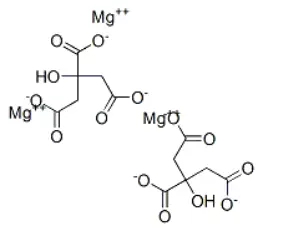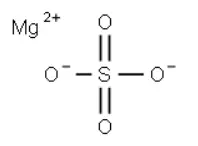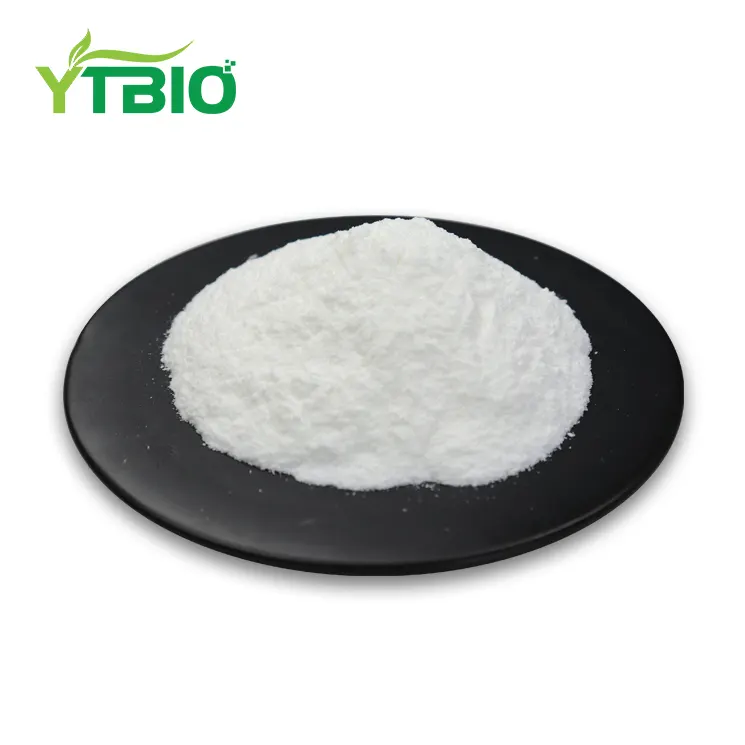L-Threonic Acid Magnesium
Assay:99%
CAS: 778571-57-6
Molecular formula: C8H14MgO10
Molecular weight: 294.5
Appearance: White To Off-white Powder
Shelf Life: 24 months
Storage Conditions: Cool And Dry Place
Shipping Speed:3-5 days
Testing Method: HPLC
Certifications:cGMP,ISO22000,ISO9001,EU&NOP Organic Certificate,Kosher,BRC,Halal,HACCP
- Fast Delievery
- Quality Assurance
- 24/7 Customer Service
Product Introduction
What is L-Threonic Acid Magnesium?
L-Threonic acid magnesium is a magnesium chelate, consisting of magnesium ions bound to L-threonic acid (a vitamin C metabolite). This form has attracted attention for its unique bioavailability and potential cognitive health benefits.
L-Threonic acid magnesium is commonly used as a dietary supplement to alleviate magnesium deficiency. Its small molecular structure and high lipid solubility allow it to more efficiently cross the blood-brain barrier, potentially supporting cognitive function, sleep quality, and neurological health. Suitable individuals include those with insufficient magnesium intake and those seeking improved mental performance or sleep, but appropriate dosage and individual variability must be considered.

L-Threonic acid magnesium has good water solubility and bioavailability, making it widely used in health foods and medicine.
YTBIO Provides You With High-quality L-Threonic Acid Magnesium:

How L-Threonic Acid Magnesium Works?
Magnesium is an essential mineral for the human body, involved in over 300 enzymatic reactions, including energy metabolism and neural signaling. L-Threonic acid magnesium, by binding magnesium to threonic acid, enhances its intracellular absorption, particularly its penetration into brain tissue. Research suggests that this form may be more beneficial for enhancing synaptic plasticity (related to learning and memory) and reducing neuroinflammation.
Main Benefits of L-Threonic acid magnesium
Improving Cognitive Function
Some animal studies have shown that L-Threonic acid magnesium can increase brain magnesium levels and promote increased synaptic density in the hippocampus, potentially improving memory and learning. Some human studies have also observed its ability to slow cognitive decline in the elderly, but further evidence is needed.
Nervous System Regulation
Magnesium stabilizes nerve cell membranes and may alleviate symptoms of anxiety and depression. Because it can enter the central nervous system, L-Threonic acid magnesium is believed to be more targeted for regulating mood.
Improves Sleep Quality
Magnesium helps relax nerves by regulating gamma-aminobutyric acid (GABA) receptor activity. L-Threonic acid magnesium may shorten the time it takes to fall asleep and increase the duration of deep sleep.
Antioxidant
Threonate itself has antioxidant properties, and when combined with magnesium, it may synergistically reduce free radical damage to nerve cells.
Potential Benefits of L-Threonic acid magnesium
Potential Treatment for Hair Loss
Many conditions of premature balding and hair loss are caused by the effects of DHT (dihydrotestosterone) on hair follicles. Several studies have shown that L-Threonic acid magnesium can attenuate DHT-induced expression of DKK-1 (DHT-induced dickkopf-1), a key factor in androgen-related alopecia and balding.
Researchers have also shown that in a co-culture system of outer hair sheath keratinocytes, DHT inhibits the growth of ORS cells, thereby accelerating hair loss. They found that L-threonate significantly reversed this effect and suggest that this form of magnesium may be an effective treatment for preventing hair loss.
Pain Relief
Oral L-Threonic acid magnesium supplementation has been associated with pain relief in patients with advanced cancer. One study evaluating 83 patients from pain and oncology wards found that starting from day 30 of the trial, those taking magnesium began requiring lower doses of morphine for pain relief.
The researchers noted that L-Threonic acid magnesium enhanced the analgesic effect of opioid analgesics while also reducing the required opioid dosage, more effectively than a placebo. Furthermore, magnesium was found to significantly alleviate opioid-induced constipation in participants.
Applications Of L-Threonic Acid Magnesium
Magnesium is an essential mineral required for enzyme reactions and plays a key role in memory formation and has a calming effect on the nervous system. Magnesium must be combined with another substance, such as citrate or chloride, to form a stable magnesium salt structure. The composition of the compound often affects magnesium absorption and distribution in the body. L-Threonic acid magnesium is unique not only in its efficient absorption through the gastrointestinal system but also in its unique ability to enter the brain from the bloodstream. This significant feature sets it apart from traditional magnesium supplements, which have little effect on magnesium levels around brain neurons. For those seeking to improve memory, regulate mood, and protect the brain, L-threonate can be used as a nutritional supplement to nourish the brain, enhance memory, relieve stress, and protect brain nerves. Threonate, as a magnesium carrier, increases magnesium absorption, boosts energy levels, and promotes normal neuronal function.
Major applications of L-Threonic acid magnesium in food
L-Threonic acid magnesium is used as a nutritional supplement to enhance the nutritional value of food. Magnesium threonate replenishes the body's magnesium needs and plays an important role in maintaining normal physiological functions. An appropriate amount of magnesium threonate can be added to special diets as a nutritional supplement. The specific dosage varies depending on the product formulation and production process.


L-Threonic acid magnesium can also be used as a food antioxidant, delaying oxidation reactions in foods, thereby extending their shelf life and preserving their color and taste.
L-Threonic acid magnesium can be used as an acidulant to adjust the pH and texture of foods, adding a richer and more diverse taste. It is commonly added to beverages, candies, and other foods.
In addition to the aforementioned primary applications, L-Threonic acid magnesium may have other potential applications in food, such as as a stabilizer and chelating agent to improve food processing properties and stability. The specific effects and dosage of these applications need to be determined based on the specific food product and production process.
Can Teenagers Take L-Threonic Acid Magnesium?
Yes,Adolescents can take L-Threonic acid magnesium.L-Threonic acid magnesium is a compound composed of threonic acid and magnesium ions. It has various benefits and is suitable for a variety of populations, including adolescents.
For adolescents, the main benefits of L-Threonic acid magnesium include:
Improving Memory
L-Threonic acid magnesium can help improve adolescents' memory and learning abilities, helping them increase learning efficiency and reduce learning difficulties.
Improving Sleep Quality
L-Threonic acid magnesium has a central nervous system inhibitory effect, effectively regulating neurotransmitter balance and relieving stress, thereby promoting sleep and improving sleep quality in adolescents.
Relieve Anxiety
L-Threonic acid magnesium can increase intracellular signaling mediated by serotonin receptors, reducing the psychological discomfort caused by stress, and helping adolescents relieve anxiety and maintain a positive mood.
Bone Health
Magnesium is an essential trace element for the human body and plays an important role in bone development. The magnesium element in L-Threonic acid magnesium can work synergistically with calcium ions on bone tissue, promoting its growth, development and mineralization process, and contributing to the bone health of adolescents.
Magnesium: A Substance Vital To The Human Body
Magnesium is involved in hundreds of biochemical and metabolic reactions throughout our body, including protein synthesis, intercellular communication, and the transport of important ions like calcium and potassium. It also helps our muscles contract and relax. Almost every life activity requires magnesium. A magnesium deficiency can lead to numerous health problems.
What symptoms indicate a need for magnesium supplementation?
1.Muscle cramps, eyelid twitching, numbness in the hands and feet, chronic muscle pain, and abnormal tremors.
2.Osteoporosis. This condition may not be due to a calcium deficiency, but rather a magnesium deficiency. Osteoporosis isn't caused by a systemic calcium deficiency, but rather by calcium in our bones, which, for various reasons, has been leached from the bones and deposited in the bloodstream.
In this case, our bones are calcium-deficient, but not our entire body. Therefore, we shouldn't supplement calcium, but magnesium. This allows these calcium ions in the blood to return to the bones, forming new bone matrix.
3.Arthritis and calcium stones throughout the body. For example, conditions like gallstones, kidney stones, and urinary stones also require magnesium supplementation. When calcium accumulates excessively in our blood, it can easily form calcium stones in various locations.



4.Certain cardiovascular problems, such as high blood pressure, myocardial arrhythmia, and atherosclerosis.
5.Magnesium plays a crucial role in our nervous system. If you experience headaches, migraines, brain fog, forgetfulness, poor memory, or insomnia, these can all be alleviated with magnesium supplementation. Emotional and psychological issues like anxiety and depression are also related to the nervous system and can be helped by magnesium supplementation.
6.Feelings of fatigue, low energy, and low metabolism also require magnesium supplementation. Our energy comes from the mitochondria in our cells, which produce ATP to provide us with energy. After the various energy substances we consume enter our cells, they are metabolized by the mitochondria to generate ATP, which then provides us with energy. Magnesium is essential for all the steps involved in mitochondrial ATP production.
In addition to the above symptoms, there are many other symptoms, such as Alzheimer's syndrome, hearing loss, eclampsia, etc., which can be improved by magnesium supplementation.
Other Common Magnesium Supplements
Magnesium Glycinate: Safe Magnesium for the Whole Family
Magnesium glycinate is one of the most bioavailable forms of magnesium, formed by combining magnesium with glycine. Compared to other forms of magnesium, it is least likely to cause diarrhea. It increases magnesium levels in red blood cells, making it the safest option for correcting chronic magnesium deficiency and ideal for those with chronic magnesium deficiency and gastrointestinal sensitivity.
Magnesium Malate: Anti-Fatigue
For those who experience frequent fatigue, magnesium malate is the best choice because it is essential for key enzymes in ATP synthesis and energy metabolism. Magnesium malate can also cross the blood-brain barrier and bind to aluminum, aiding in detoxification. It is also ideal for those with chronic fatigue syndrome.
Magnesium Chloride: Topical Magnesium Supplement
Magnesium chloride has a very high absorption rate and is commonly found in magnesium oil and gel.
It bypasses the digestive tract for absorption, penetrates through the skin into the subcutaneous tissue, and participates directly in the body's metabolism. It can be used for detoxification, supports kidney function, and promotes metabolism. However, this form of magnesium may cause itching. It can be applied to the ankles. It's better suited for those who are afraid of supplements and have sensitive gastrointestinal tracts. It's not suitable for those with broken skin or allergies. The ideal concentration is to add about 30-60ml of magnesium oil or gel to a foot basin of warm water and soak your feet daily, or at least three times a week.
Magnesium Citrate: Suitable for Constipation
Magnesium citrate is highly absorbable and, through osmosis, increases intestinal moisture, softens stool, and promotes bowel movements, making it an excellent laxative. It's best suited for short-term or intermittent use for constipation, providing rapid relief. Overuse requires careful attention to electrolyte and hydration intake. Because it can easily cause diarrhea, it's not suitable for those with chronic kidney disease or frequent diarrhea. It's also not suitable for long-term magnesium supplementation; alternative magnesium forms are recommended.





In order: magnesium glycinate, magnesium malate, magnesium chloride, magnesium citrate, magnesium sulfate
Magnesium Sulfate: Bathing for Magnesium Supplementation
Magnesium sulfate, commonly known as Epsom salt, can be absorbed through the skin. It not only regulates neuromuscular function but also promotes melatonin secretion and improves sleep. It's best suited for those experiencing muscle soreness after exercise, insomnia, and mild magnesium deficiency. It's not suitable for those with broken skin or allergies to avoid irritation. The recommended concentration is to dissolve 500g of Epsom salt in 57 liters of water in a standard bathtub, stir until completely dissolved and then soak, soaking 2-3 times a week for 15 minutes each time.
YTBIO has own factory and R&D team, dedicated to providing you with high-quality L-Threonic acid magnesium and services. If you have any questions or needs, please contact us and we will respond to you as soon as possible.
_1737093401309.png)

